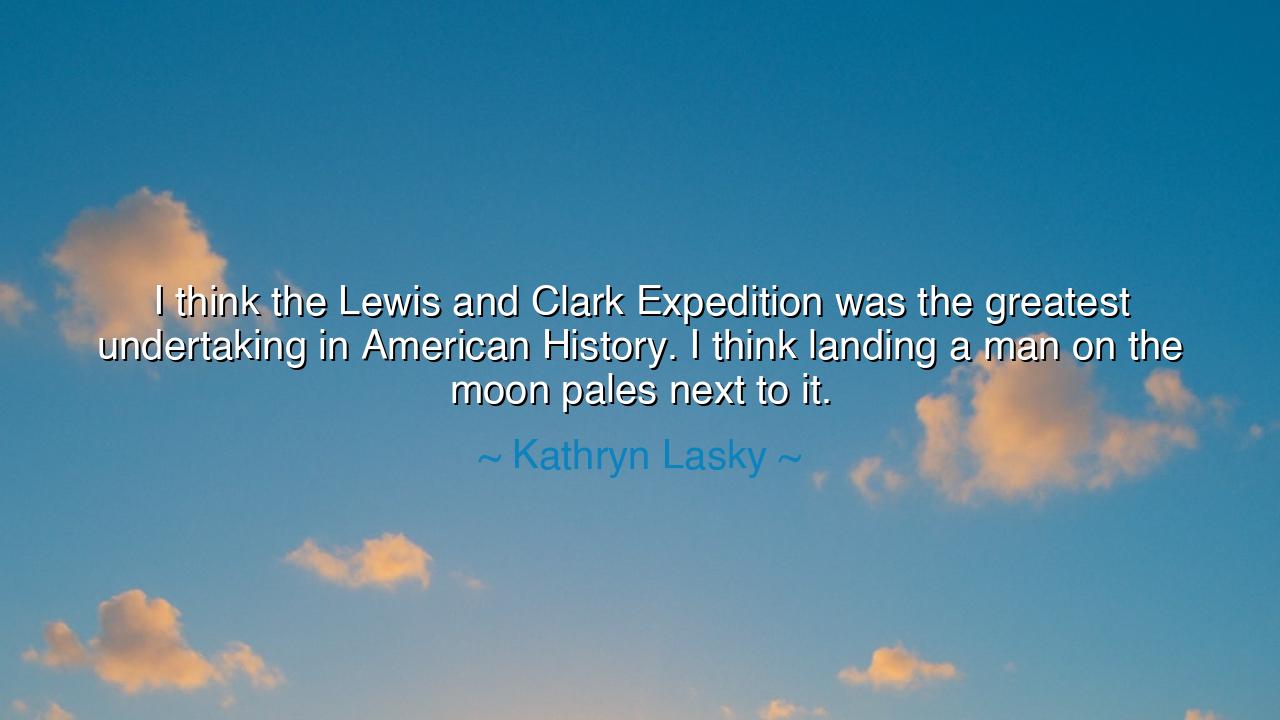
I think the Lewis and Clark Expedition was the greatest
I think the Lewis and Clark Expedition was the greatest undertaking in American History. I think landing a man on the moon pales next to it.






In the stirring words of Kathryn Lasky, we find a tribute not only to courage, but to the very spirit that shapes nations: “I think the Lewis and Clark Expedition was the greatest undertaking in American history. I think landing a man on the moon pales next to it.” At first, her words may seem a bold claim, for to walk upon the moon was to defy the heavens themselves. Yet, beneath her reflection lies a truth as vast as the wilderness that Lewis and Clark once crossed—that the conquest of the unknown on earth, guided by mortal hands and faith alone, carries a raw and sacred power that no machine or technology can ever replace.
The origin of this quote reaches into the early years of the nineteenth century, when two men—Meriwether Lewis and William Clark—set forth at the command of President Thomas Jefferson to explore the uncharted lands of the Louisiana Purchase. It was 1804, and the western continent remained a mystery: a world of mountains that scraped the heavens, of rivers that wound through endless forests, of peoples whose tongues and customs were yet unknown. With only rudimentary maps, crude tools, and an unbreakable will, these men and their companions embarked upon a journey that would span more than two years and reshape the destiny of a nation.
To call their expedition the greatest undertaking is to recognize the enormity of what they faced—not only distance and danger, but the limits of human understanding. The moon, for all its distance, is a single, silent sphere; but the wilderness of early America was alive, unpredictable, and immeasurable. Every mile was a question; every sunrise, a new peril. They faced hunger, illness, and storm. They crossed mountains that seemed to have no end and rivers that could swallow them whole. And yet, they pressed on—not for conquest or gold, but for knowledge, for discovery, for the expansion of the horizon of mankind.
There is a story, told often but never old, of the moment when Lewis and Clark first beheld the Pacific Ocean after months of hardship. The men, weathered and weary, stood upon the western shore, gazing upon waters they had only imagined. Their journals tell of relief mingled with awe—a sense that they had touched the edge of the earth and found it holy. No machine had borne them there, no calculations had guided their path. Only the courage of the human heart, the endurance of the body, and the light of curiosity had brought them through. That moment, simple and silent, stands as a symbol of all that is noble and enduring in the human spirit.
And so, when Lasky declares that the moon landing pales beside it, she speaks not in disdain of science, but in reverence for the human journey itself. For Lewis and Clark had no engines, no radio, no protection from the fury of nature. Their tools were trust, friendship, and the will to persevere. Their voyage reminds us that exploration is not measured in miles or planets, but in the strength of those who dare the unknown with faith alone. Theirs was not a mission of machines, but of men and women—among them the brave Sacagawea, who, with her infant child, guided them through terrain and tribes unfamiliar to them. Her wisdom and endurance embodied the quiet heroism that shapes history unseen.
From this tale arises a lesson that must not fade: true greatness lies not in technology, but in tenacity. The spirit of Lewis and Clark lives in every soul who steps into the unknown—who risks comfort for truth, who replaces fear with wonder. To explore, in any age, is to trust in oneself and in the unseen hand of providence. The frontier is not gone; it merely changes shape. It may no longer be the wilderness of the West, but the depths of the mind, the mysteries of the soul, or the uncharted lands of compassion and wisdom.
So, my children, remember this: when the world seems vast and uncertain, walk forward as Lewis and Clark did—with courage, with curiosity, and with faith. Do not wait for the path to be paved before you; make the path by your own steps. For it is not the reaching of distant stars that defines our greatness, but the crossing of the wilderness within ourselves. And when you stand at the shore of your own discovery, weary but unbroken, may you see, as they once did, that the greatest undertaking is not what we conquer—but what we become along the way.






AAdministratorAdministrator
Welcome, honored guests. Please leave a comment, we will respond soon